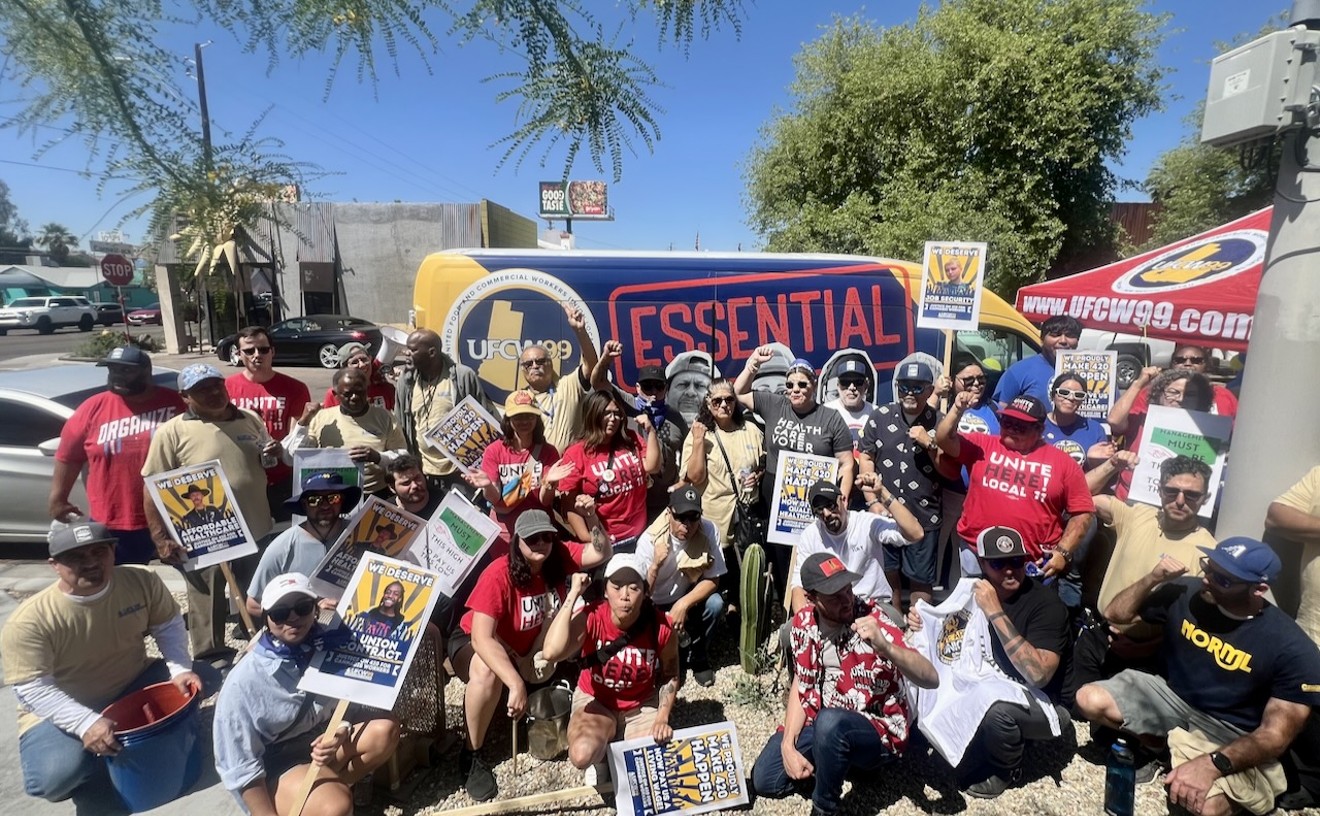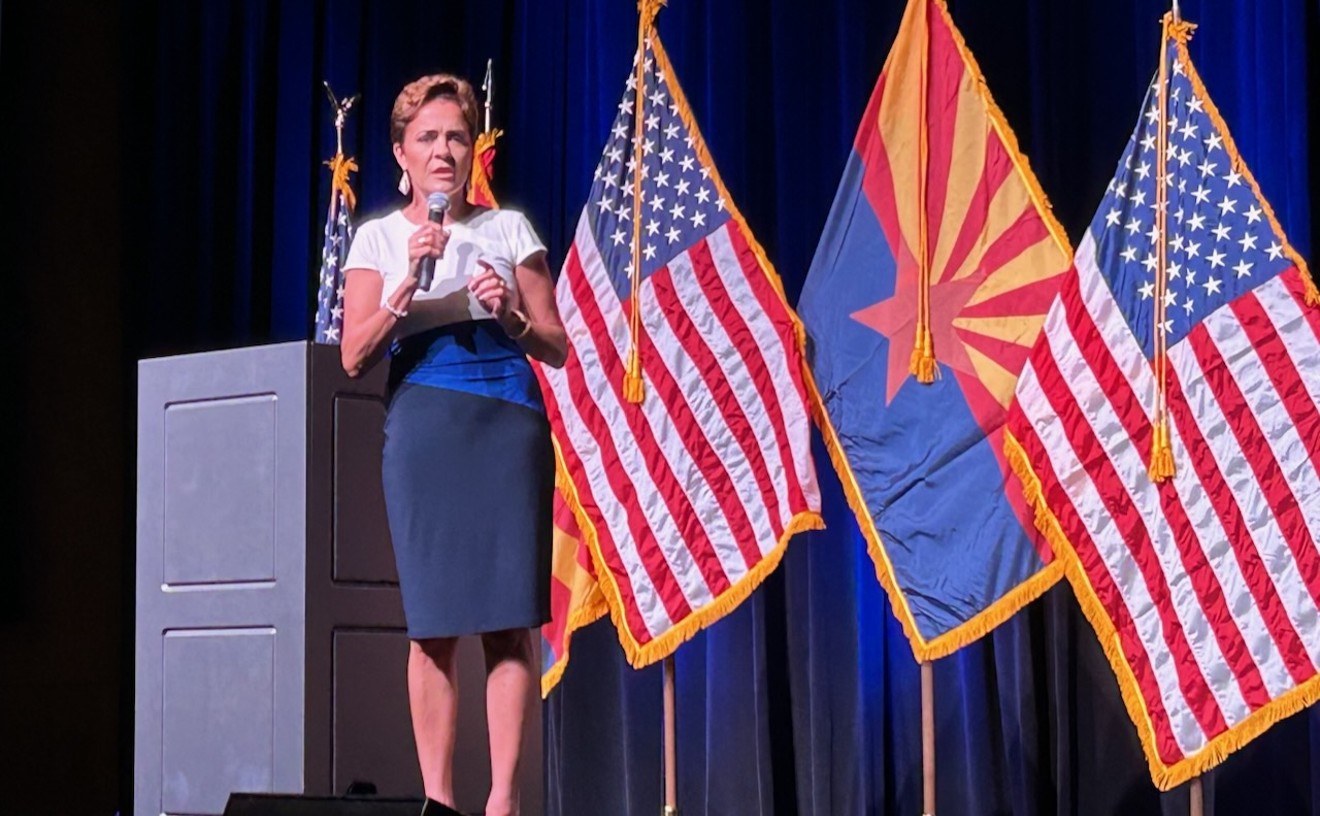"Please, card my son," reads the digital billboard on the southwest corner of Seventh and Lincoln streets. "Regulate the sale of marijuana and help me keep it out of his hands."
The Campaign to Regulate Marijuana Like Alcohol in Arizona drew nationwide attention in May for its Mother's Day billboard, including a humorous mention by Tonight Show host Jimmy Fallon. So it only made sense for a follow-up that targets Father's Day this Sunday."The war on drugs has done little to nothing to keep cannabis out of the hands of our youth." — J.P. Holyoak
tweet this
Backed by Arizona dispensaries and the national Marijuana Policy Project, which brought Arizona its popular medical-marijuana law and Colorado's recreational-cannabis law, the CRMLA aims to all but end zero-tolerance felony prohibition in the state.
Voters will make their choice in November on the group's ballot measure, which would legalize personal amounts of marijuana and live plants for adults 21 and older and allow about 150 retail stores statewide to sell cannabis products.
J.P. Holyoak, a local dispensary principal and chair of the CRMLA, held a morning news conference to introduce the latest billboard. He was joined by about a dozen members of Parents for Responsible Regulation and Momforce, two groups fighting to end felonies in Arizona for simple possession or cultivation. Their overarching point: Regulation would curb the incentive for black-market dealers to sell pot to kids.
"The War on Drugs has done little to nothing to keep cannabis out of the hands of our youth," Holyoak told reporters, adding that the CRMLA would add tens of millions in tax revenue for state schools.
Sonia Martinez, a Mesa attorney, said another problem with prohibition is that when teenagers meet drug dealers with pot, the dealers often have other illegal drugs to offer.
"As a parent, I would do anything to protect my children," she said. "So let's do better — let's regulate it."
Kathy Inman, head of Momforce, pointed out that the use of legal alcohol and tobacco by teenagers has declined over past years because of education and regulation. She's optimistic that voters will approve the initiative.
"People are ready for this," she said.
Whether that's true remains to be seen. Polls have shown that Arizona voters are split on the issue, which could translate to an extremely tight race on Election Day.
It's unknown how much — or if — legalized cannabis would increase cannabis usage by adults or minors. National and local government surveys show that since Colorado opened adult-use marijuana stores in 2014, cannabis use by teens hasn't risen significantly. In Arizona, surveys show the use of marijuana by teenagers has actually declined since the state legalized medical marijuana in 2010. But pot prohibitionists noted that the same statistics show that use of cannabis by Colorado's children has gone up, even if that increase wasn't considered statistically significant.
An e-mail from New Times to the political group opposing the CRMLA, Arizonans for Responsible Drug Policy, wasn't immediately returned.
Dayton Hansen of Phoenix is the father of a 16-year-old daughter. He listed a number of reasons he thought cannabis ought to be made legal for adults.
Prohibition "creates a criminal class that breeds corruption," he said, explaining that it creates needless criminal convictions that affect employment opportunities, enables our for-profit prison system, and gives up the tax revenue for a substance that many Arizonans will consume regardless of the legality. "I'd rather see that money go for schools," Hansen said.
Hansen said he has consumed marijuana in the past but doesn't now because he doesn't want to take the chance of having it affect his career as a nurse.
UPDATE: Just after publication of this article, ARDP's Seth Leibsohn released a statement:
"Leave it to the marijuana industry to take a holiday of joy and family bonding to promote the expanded sale and use of a drug better known by medical and scientific research to be the opposite of those very things," Leibsohn said. "We are just now learning about increased traffic fatalities due to marijuana impaired drivers in states that have legalized marijuana for social and recreational use. We are just now learning about more and more childhood hospitalizations due to marijuana ingestion by our youth due to marijuana candies and edibles."
His written statement then detailed several statistics the group believes is relevant to the debate about the legalization of cannabis. Click here for the group's "facts."
Yet Leibsohn's incorrect about the "increased traffic fatalities due to marijuana impaired drivers," by the way. Officials in Colorado and Washington, which both have recreational-cannabis laws on the books, told New Times previously that while more drivers in accidents have tested positive for cannabis, authorities have no idea if those drivers caused the accidents.
He's right about the increase in hospitalizations, but fails to note not a single kid has died or suffered from any apparent harm from the experience. Plus, as cannabis advocates note, far more American children are admitted to hospitals each year due to ingestion of laundry detergent than marijuana.











